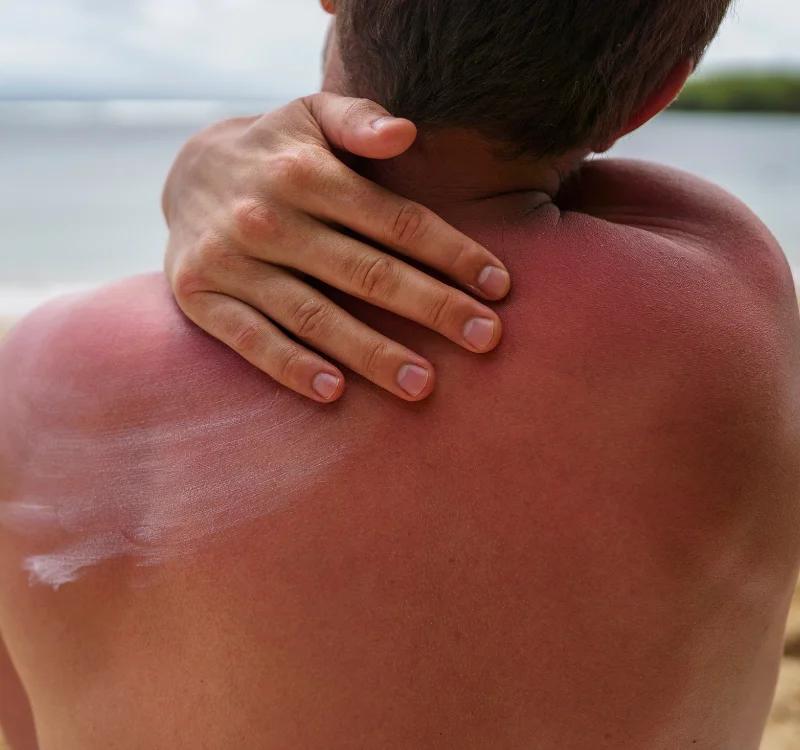


When we think about sunshine, we often associate it with positivity, happiness, and energy, as well as. It also benefits in providing Vitamin D. However, too much sun exposure can cause sun damage to your skin, and this damage can often lead to some skin disorders and skin issues, such as tanning, acne, etc. To avoid this, you need to protect your skin with sunscreen and other solutions to prevent sun damage.
Sun damage is a type of degradation caused to your skin due to direct exposure to sunlight or ultraviolet rays such as UVA and UVB. These cause direct damage deep into your skin, degrading its quality and leading to wrinkles, fine lines, dehydration, pain, and hyperpigmentation. It can worsen with time. To avoid sun damage, you need to protect your skin with some effective solutions.
There are several problems that occur due to sun damage some of the main problems are mentioned below:
1. Pigmentation:
When you feel excess melanin production in your skin due to UV radiation, which is caused by the sun's rays directly entering your skin, it can cause pigmentation, which is the darkening of some areas such as dark spots and uneven skin tone. It can occur on your face, hands, and legs, and it requires attention and good sun protection.
2. Acne & Breakouts:
Direct sun exposure can cause acne and breakouts on your face and other areas of the skin because UV radiation from the sun can cause excessive sebum production, which leads to clogged pores and causes itchiness, sunburn, and pimples on your face. To reduce these acne and pimples, you need to top your skin with a light moisturizer and sunscreen.
3. Photoaging:
Photoaging or premature aging of the skin is one of the most common sun damage types, which is caused by UV exposure, and it leads to wrinkles and fine lines, making you look older. This occurs because harsh sun rays break down the collagen and good bacteria in your skin, which leads to premature aging of the skin quality.
Excessive sun exposure without protection can dehydrate your skin, causing dryness and increasing the risk of wrinkles. Avoid hot water in summer as it strips the skin of moisture. Use hydrating creams that contain glycerin.
5. Solar Lentigines:
Solar lentigines are the spots or dark spots that occur on the skin due to sun exposure directly. They are usually brown and dark in color, and they can be in different shapes and sizes. You can see them mostly on your forehead, hands, and face, and they look like black moles, but actually, it is sun damage.
6. Actinic Keratosis:
Actinic keratosis is a skin condition that is caused due to sun damage, and you can notice rough and dry reddish patches on your skin, which are quite dangerous, and if not taken care of, it can lead to some severe skin disorders. To treat this, you need to see a consultant or dermatologist.
Most people consider photoaging a type of sun damage. Photoaging refers to the premature aging of the skin. It also leads to wrinkles and fine lines on your face. It is a type of sun damage caused by UV radiation.
While sun damage is the overall damage that a person can experience due to direct exposure to UV radiation from the sun, you can see issues like sunburn, acne, hyperpigmentation, and some skin conditions like keratosis, solar elastosis, solar lentigines, dehydration, and many more.
There are several remedies and precautionary methods you can take to reduce sun damage some of them are mentioned below:
1. Always Apply Sunscreens:
Apply sunscreen daily before stepping out to protect your skin from UV rays. Sunscreen helps block harmful radiation and prevents further damage.
2. Stay Hydrated & Use Serums:
To reduce sun damage internal and external hydration is crucial. Apply serums containing ceramides, hyaluronic acid, and vitamin C. These help reduce the dark spots, fine lines, and any sun damage caused to your skin. It also helps in improving complexion and gives you a brighter and radiant glow.
Fruits are rich in antioxidant and fibrous properties that helps in toxifying the body and make it strong enough to fight against sun damage and keeps you energetic as well.
4. DIY Face Packs:
To soothe redness and inflammation caused by sun damage, use DIY face packs with cooling and calming properties. Some are listed below-
Multani Mitti has natural cooling properties that remove excess oil and dirt from the skin and cleanse it deeply. Using it as a pack can help you protect your skin from sun damage.
-Aloe Vera Gel With Honey:
Aloe vera gel has antibacterial properties which helps in reducing redness and breakouts. Using it as a face mask along with honey can help you in maintaining the perfect skin tone along with treating sun damage on your face and keeps you cool.
Sun damage is a serious issue that affects skin quality and can lead to photoaging, skin irritation, and other skin concerns.. To reduce sun damage, follow some simple steps such as using sunscreen, staying hydrated, and using serums that contain ceramides, vitamin C, and hyaluronic acid.
How do you treat sun damaged skin on face?
Treat damaged facial skin with gentle exfoliation, moisturizing, and products containing retinoids and antioxidants.
Which serum is best for sun damaged skin?
What is sun damaged skin called?
Is sun damage to the skin reversible?
How long does it take for sun damage to occur?
How to repair sun damaged skin?
How to treat sun damaged skin?